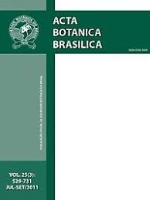
Acta Botanica Brasilica
Scope & Guideline
Connecting Researchers to the Heart of Plant Science
Introduction
Aims and Scopes
- Plant Conservation and Biodiversity:
The journal emphasizes research related to the conservation of plant species, particularly those that are endangered or endemic to Brazil, with studies that propose conservation strategies and assess biodiversity. - Ecological Interactions and Plant Physiology:
Research on plant-environment interactions, including physiological responses to abiotic factors like salinity and climate change, is a core focus, providing insights into plant adaptability and resilience. - Taxonomy and Systematics:
Acta Botanica Brasilica publishes taxonomic revisions and phylogenetic studies that enhance the understanding of plant classification and nomenclature, contributing to the scientific foundation for biodiversity studies. - Floristic Studies and Ecology:
The journal covers floristic inventories and ecological assessments of various biomes in Brazil, contributing to the understanding of species distribution and ecological dynamics. - Mycorrhizal and Fungal Interactions:
Research on the role of fungi, particularly arbuscular mycorrhizal fungi, in plant ecology and their influence on biodiversity and ecosystem functioning is a recurring theme.
Trending and Emerging
- Climate Change and Its Impact on Flora:
Recent publications increasingly address the effects of climate change on plant species, highlighting adaptive mechanisms and potential shifts in distribution patterns as critical areas of focus. - Molecular and Genomic Studies:
There is a growing trend towards molecular research, including genomic studies that investigate genetic diversity and evolutionary relationships among plant species, enhancing our understanding of plant biology. - Plant-Pollinator Interactions:
Research on the dynamics of plant-pollinator interactions is gaining traction, emphasizing the importance of these relationships for plant reproductive success and ecosystem health. - Sustainable Management and Restoration:
Emerging themes include studies on sustainable management practices and ecological restoration techniques aimed at rehabilitating degraded areas and enhancing biodiversity. - Microbial Interactions and Plant Health:
The role of endophytic and mycorrhizal fungi in promoting plant health and resilience is increasingly recognized, leading to a rise in research exploring these relationships.
Declining or Waning
- Invasive Species Research:
Although still relevant, the frequency of studies specifically focused on invasive plant species and their impacts has decreased, possibly due to a broader focus on conservation and native species restoration. - Traditional Uses of Plants:
Research highlighting traditional uses of plants, particularly in ethnobotany, has seen a decline, likely overshadowed by more pressing conservation and ecological studies. - Aquatic Plant Studies:
The number of publications focusing on aquatic plants and their ecological roles appears to be waning, with fewer studies addressing these ecosystems as compared to terrestrial environments.
Similar Journals

PLANT SPECIES BIOLOGY
Championing the Study of Plant Diversity and EcologyPLANT SPECIES BIOLOGY, published by WILEY in the United Kingdom, is a prominent journal dedicated to advancing the understanding of plant species, their biology, ecology, and roles within ecosystems. With an impressive convergence of research dating back to 1986 and extending through 2024, this journal caters specifically to specialists in the fields of plant science and ecology. The journal's current impact factor further underscores its significance, ranking in the Q2 quartile across three relevant categories: Ecology, Ecology, Evolution, Behavior and Systematics, and Plant Science. As a member of the Scopus ranks, it holds respectable positions within its categories, evidencing its contribution to impactful scientific discussions and knowledge. Although it is not an open-access journal, PLANT SPECIES BIOLOGY provides essential insights, fostering interdisciplinary dialogue and discovery for researchers, professionals, and students dedicated to exploring the complexities of plant species and their ecosystems.
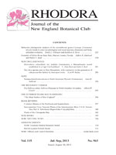
RHODORA
Connecting Scholars Through Botanical DiscoveriesRHODORA, published by the New England Botanical Club Inc, is a prominent journal dedicated to the field of botany, specifically focusing on Horticulture and Plant Science. With a rich history dating back to its founding years and ongoing publication from 1995 to 2024, this journal serves as a vital platform for disseminating research, reviews, and advancements in botanical studies. Though classified in the Q4 quartile for both horticulture and plant science in 2023, RHODORA remains an essential resource for researchers and practitioners, providing insights into plant ecology, conservation, and cultivation practices. While it does not offer Open Access options, the journal's commitment to quality research in a highly specialized field makes it a significant contributor to the botanical sciences, fostering collaboration and innovation among scholars and professionals in the United States and beyond.
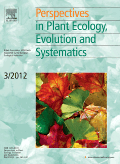
PERSPECTIVES IN PLANT ECOLOGY EVOLUTION AND SYSTEMATICS
Bridging Disciplines for a Sustainable Future in Plant SciencePERSPECTIVES IN PLANT ECOLOGY, EVOLUTION AND SYSTEMATICS is a premier scientific journal published by Elsevier GmbH, dedicated to advancing knowledge and understanding in the fields of plant ecology, evolution, and systematics. With an impressive impact factor and a solid reputation within the top quartile (Q1) of both Ecology and Plant Science categories, this journal ranks among the elite, positioned 100th out of 721 journals in its field, reflecting its significant contribution to ongoing research and academic dialogue. Established in 1998 and converging through to 2024, this journal not only serves as a crucial platform for researchers, professionals, and students alike but also emphasizes innovative methodologies and interdisciplinary approaches to address pressing environmental issues. Although it follows a traditional access model, the wealth of rigorous peer-reviewed articles available will engage the scientific community and facilitate advancements in understanding plant diversity and ecological interactions.
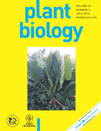
PLANT BIOLOGY
Unveiling the Secrets of Plant EcologyPLANT BIOLOGY is a prestigious academic journal published by Wiley, dedicated to advancing knowledge in the fields of plant science, ecology, and evolutionary biology. With an impressive impact factor and ranking in the Q1 category for Ecology, Evolution, Behavior and Systematics, and Plant Science as of 2023, it stands at the forefront of research dissemination. The journal encompasses a broad scope of plant biology topics, providing a critical platform for researchers to share innovative findings and foster interdisciplinary collaboration. Available in both print (ISSN: 1435-8603) and online formats (E-ISSN: 1438-8677), it ensures accessibility through open access options. As a crucial resource for professionals, researchers, and students alike, PLANT BIOLOGY cultivates a deeper understanding of plant systems and their ecological significance, making it an essential addition to the library of anyone dedicated to the study of biology and the environment.

Bangladesh Journal of Plant Taxonomy
Connecting researchers to the heart of plant science.Welcome to the Bangladesh Journal of Plant Taxonomy, a leading open-access publication dedicated to advancing the understanding of plant taxonomy in the context of Bangladesh's rich biodiversity. Published by the Bangladesh Association of Plant Taxonomists, this journal plays a crucial role in fostering academic discourse and dissemination of research findings since its establishment. With its ISSN 1028-2092 and E-ISSN 2224-7297, the journal provides a platform for researchers, professionals, and students to share their contributions to plant science. Although it has discontinued its coverage in Scopus from 2018, it remains a valuable resource, evidenced by its rankings in the agricultural and biological sciences categories, including a placement of #330/403 in Plant Science and #515/588 in Ecology, Evolution, Behavior, and Systematics. Open access since 2005, the journal ensures that critical research is freely available to all, supporting the global community in the study and preservation of plant biodiversity.

BRITTONIA
Elevating Plant Science Research Since 1931BRITTONIA, published by Springer, stands as a reputable journal dedicated to advancing the fields of botany and plant sciences. With a storied history dating back to 1931, this journal has evolved to embrace contemporary research spanning various aspects of plant biology, ecology, and systematics. Focusing on a comprehensive analysis of both ecological interactions and plant systematics, BRITTONIA plays a crucial role in disseminating knowledge among researchers and professionals committed to understanding plant life and its environmental contexts. Despite its open access status being currently unavailable, the journal ensures wide accessibility through institutional subscriptions. In the latest rankings, it proudly holds a Q2 category in Plant Science and a Q3 category in Ecology, Evolution, Behavior, and Systematics, indicating its growing influence and academic rigor. Researchers and students alike will find BRITTONIA an essential resource for the latest findings and discussions in plant sciences.
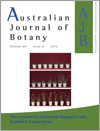
AUSTRALIAN JOURNAL OF BOTANY
Advancing plant sciences for a sustainable future.The Australian Journal of Botany is a prestigious peer-reviewed journal published by CSIRO PUBLISHING, dedicated to advancing the field of plant sciences and ecology. Established in 1953, this journal provides a critical platform for researchers to share original research findings, reviews, and perspectives in subjects ranging from plant biology to ecological interactions, with a focus on Australian flora and its conservation. With an impressive impact factor and categorized in the Q3 quartile in both Ecology, Evolution, Behavior and Systematics and Plant Science, the journal ranks competitively within its fields, allowing authors to reach a diverse audience of professionals, students, and fellow researchers. The journal is accessible in print and electronically through its ISSN: 0067-1924 and E-ISSN: 1444-9862, providing wider access to vital research outcomes that influence environmental policies and natural resource management. As it aspires towards innovation and excellence, the Australian Journal of Botany remains an essential resource for those passionate about the richness of plant biodiversity and ecological understanding.
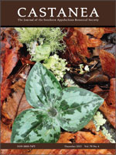
CASTANEA
Nurturing Knowledge in Plant Conservation and ResearchCASTANEA is a distinguished journal published by the SOUTHERN APPALACHIAN BOTANICAL SOCIETY in affiliation with NEWBERRY COLLEGE. With an ISSN of 0008-7475 and an E-ISSN of 1938-4386, this esteemed publication serves as a vital platform for researchers and practitioners in the field of Plant Science. It has been circulating since 1982, and its scope focuses on the study of trees, their ecology, and conservation, thereby contributing significant insights into the biodiversity of the Southern Appalachian region and beyond. Despite its current ranking in the Q4 quartile and the 5th percentile in the Scopus Agricultural and Biological Sciences category, CASTANEA is committed to advancing knowledge and fostering a deeper understanding of plant sciences among academics and students alike. The journal does not currently offer Open Access options, maintaining a traditional subscription model that allows for carefully curated and peer-reviewed content. As you explore the advances in plant biology through CASTANEA, you will find an invaluable resource that supports both emerging and established scholars in their research endeavors.

PLANT SYSTEMATICS AND EVOLUTION
Transforming Understanding of Plant LineagesPlant Systematics and Evolution is a prestigious journal published by Springer Wien, dedicated to advancing research within the fields of plant taxonomy, evolution, and ecology. With its ISSN 0378-2697 and E-ISSN 1615-6110, this journal has been pivotal in shaping the scientific landscape since its inception in 1974. Based in Austria, it occupies a significant position in the academic community, being ranked in the Q2 quartile in both Ecology, Evolution, Behavior and Systematics and Plant Science as of 2023. This high-impact journal is recognized for its rigorous peer-review process and is indexed among the top publications in its category, holding a Scopus rank of #176 out of 516 in Plant Science and #252 out of 721 in Ecology, highlighting its relevance and quality in the research community. Although it does not currently offer open access, the journal is committed to making significant contributions to the understanding of plant biodiversity and evolutionary processes. This makes it an essential resource for researchers, professionals, and students aiming to know the latest developments in the study of plant systematics and evolution.
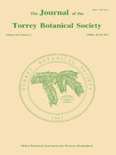
JOURNAL OF THE TORREY BOTANICAL SOCIETY
Exploring the intricate connections of plant life and ecosystems.JOURNAL OF THE TORREY BOTANICAL SOCIETY is a prominent academic journal dedicated to advancing the fields of botany and ecology, published by the esteemed TORREY BOTANICAL SOCIETY. With an ISSN of 1095-5674 and an E-ISSN of 1940-0616, this journal serves as a critical platform for researchers, professionals, and students to share their findings and insights. Despite its status in the Q4 category for the 2023 rankings across Ecology, Plant Science, and Ecology, Evolution, Behavior and Systematics, the journal continues to foster significant discourse and collaboration in the botanical sciences, aiming to elevate the understanding of plant biology and ecosystems. Its open access options enhance accessibility, ensuring that groundbreaking research reaches a wider audience. Published in the United States, the journal features work from both established scientists and emerging scholars, making it a vital resource for anyone involved in the study of plants and their environmental interactions. Explore the JOURNAL OF THE TORREY BOTANICAL SOCIETY to engage with cutting-edge research and contribute to the ongoing dialogue in the botanical sciences.